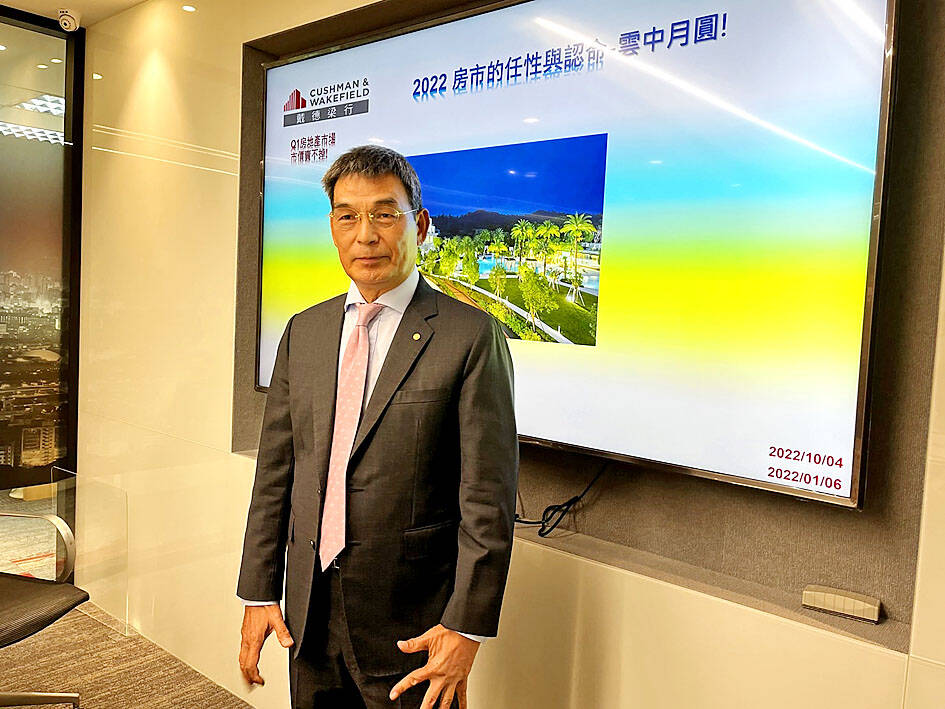Commercial property transactions last quarter totaled NT$34.6 billion (US$1.09 billion), up 24.9 percent from three months earlier on the back of solid demand for factories and factory offices, the local branch of international property consultancy Cushman & Wakefield said yesterday.
The volume reversed two previous quarters of decline, boosted by Taiwan Life Insurance Co’s (台灣人壽) purchase of an industrial building in Taoyuan’s Cingpu District (青埔) for NT$6.3 billion, Cushman & Wakefield Taiwan said.
The market is poised to slow or correct itself, as interest rate hikes would add hurdles to the investment plans of life insurers and other institutional players, which accounted for 65 percent of transactions in the first three quarters of this year, it said, adding that economic uncertainty also warrants caution.

Photo: Hsu Yi-ping, Taipei Times
Interest rate hikes mean that life insurers have to look for investment targets that generate higher rental incomes to meet regulatory requirements on minimum yields. The options would narrow in light of property price increases.
“There won’t be a revenge rebound to celebrate the upcoming border reopening ... rather, inflation, monetary tightening and other risks would continue to weigh on confidence,” Cushman & Wakefield Taiwan managing director Billy Yen (顏炳立) said, referring to an easing of COVID-19 rules for people arriving in Taiwan from Thursday next week.
The bull market is over, although the sell side is refusing to concede and is generally standing firm on prices, Yen said.
Confusion and chaos would dominate the market this quarter and price corrections would appear inevitable next year if things fail to improve, he said.
Land deals last quarter totaled NT$52.1 billion and would drop to between NT$160 billion and NT$180 billion for the whole of this year, lower than the 10-year average of NT$197.3 billion, ending three years of boom, the consultancy said.
Property developers have turned conservative about building land stock, shifting focus to urban renewal projects and joint ventures with land owners to cut development costs, it said.
The strategy makes sense, as it falls in line with the government’s policy to enhance building safety and would rein in business risks when building material costs rise and sales rates stall, it said.
Yen said he does not expect major land deals soon, but owners remain upbeat about land prices, which would translate into a 10 percent increase in presale house projects this quarter.
Price corrections would start in second-tier locations where property developers have overpriced projects, Yen said.

MULTIFACETED: A task force has analyzed possible scenarios and created responses to assist domestic industries in dealing with US tariffs, the economics minister said The Executive Yuan is tomorrow to announce countermeasures to US President Donald Trump’s planned reciprocal tariffs, although the details of the plan would not be made public until Monday next week, Minister of Economic Affairs J.W. Kuo (郭智輝) said yesterday. The Cabinet established an economic and trade task force in November last year to deal with US trade and tariff related issues, Kuo told reporters outside the legislature in Taipei. The task force has been analyzing and evaluating all kinds of scenarios to identify suitable responses and determine how best to assist domestic industries in managing the effects of Trump’s tariffs, he

TIGHT-LIPPED: UMC said it had no merger plans at the moment, after Nikkei Asia reported that the firm and GlobalFoundries were considering restarting merger talks United Microelectronics Corp (UMC, 聯電), the world’s No. 4 contract chipmaker, yesterday launched a new US$5 billion 12-inch chip factory in Singapore as part of its latest effort to diversify its manufacturing footprint amid growing geopolitical risks. The new factory, adjacent to UMC’s existing Singapore fab in the Pasir Res Wafer Fab Park, is scheduled to enter volume production next year, utilizing mature 22-nanometer and 28-nanometer process technologies, UMC said in a statement. The company plans to invest US$5 billion during the first phase of the new fab, which would have an installed capacity of 30,000 12-inch wafers per month, it said. The

Taiwan’s official purchasing managers’ index (PMI) last month rose 0.2 percentage points to 54.2, in a second consecutive month of expansion, thanks to front-loading demand intended to avoid potential US tariff hikes, the Chung-Hua Institution for Economic Research (CIER, 中華經濟研究院) said yesterday. While short-term demand appeared robust, uncertainties rose due to US President Donald Trump’s unpredictable trade policy, CIER president Lien Hsien-ming (連賢明) told a news conference in Taipei. Taiwan’s economy this year would be characterized by high-level fluctuations and the volatility would be wilder than most expect, Lien said Demand for electronics, particularly semiconductors, continues to benefit from US technology giants’ effort

‘SWASTICAR’: Tesla CEO Elon Musk’s close association with Donald Trump has prompted opponents to brand him a ‘Nazi’ and resulted in a dramatic drop in sales Demonstrators descended on Tesla Inc dealerships across the US, and in Europe and Canada on Saturday to protest company chief Elon Musk, who has amassed extraordinary power as a top adviser to US President Donald Trump. Waving signs with messages such as “Musk is stealing our money” and “Reclaim our country,” the protests largely took place peacefully following fiery episodes of vandalism on Tesla vehicles, dealerships and other facilities in recent weeks that US officials have denounced as terrorism. Hundreds rallied on Saturday outside the Tesla dealership in Manhattan. Some blasted Musk, the world’s richest man, while others demanded the shuttering of his